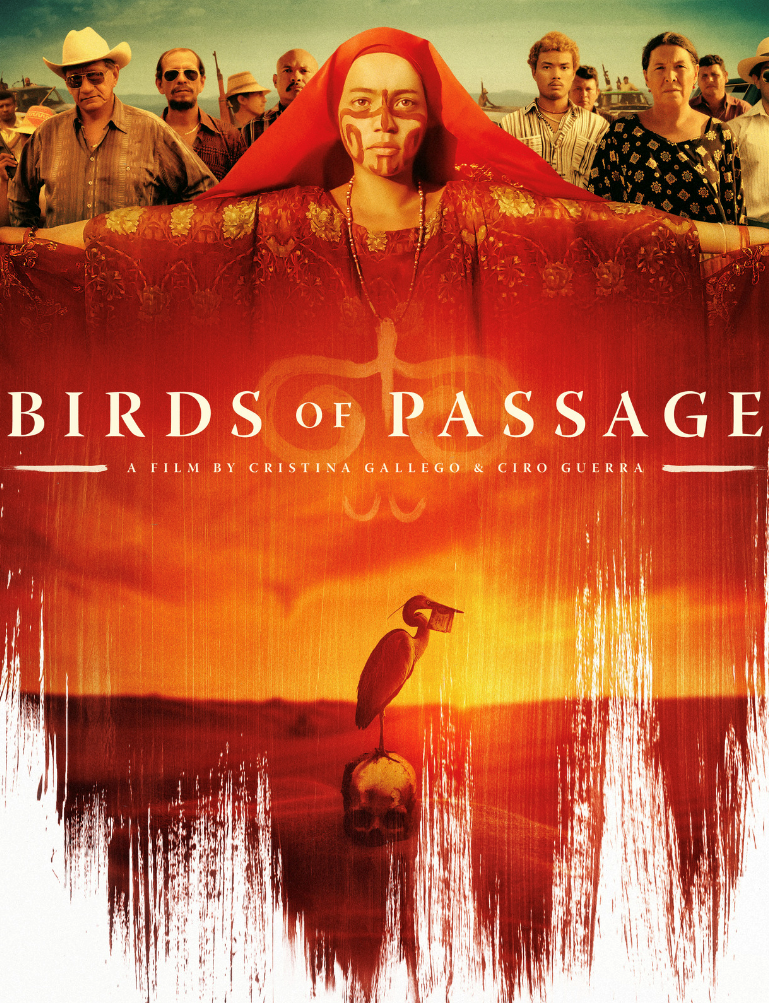
Movie directed by CIRO GUERRA and CRISTINA GALLEGO
Review by HANNAH GERSEN
From its joyous opening dance sequence to its melancholy ending, Birds of Passage (Pájaros de verano) is unlike any movie you have seen about illegal drug trafficking. It’s a gangster movie that downplays violence, looks closely at attempts at peacemaking, and is centered on the fate of a mother and a daughter. Set in Colombia between the late 1960s and early 1980s, the film is told from the perspective of a Wayúu family who live in the arid, northern region of the country and become significant exporters of marijuana to the U.S. Their success in the drug trade brings wealth, but it also pulls them into a world of violence and greed that engulfs and divides their family and their community.
The family’s involvement in the international sale of cannabis begins, innocently enough, with a marriage proposal. Rapayet (José Acosta), a Wayúu man who works outside the Wayúu community, wishes to marry beautiful young Zaida (Natalia Reyes), the daughter of Úrsula (Carmiña Martínez), a powerful Wayúu matriarch. Úrsula is suspicious of Rapayet’s associations with alijunos (non-Wayúu people) and doesn’t think he will be true to his origins. She demands an extraordinary dowry of goats, mules, cows, and several valuable necklaces. She does not expect to see him again.
But Rapayet is more resourceful than Úrsula knows. He’s already in business with his alijuno friend, Moisés, selling liquor to local bars. When he overhears some Peace Corps workers say that they are looking for marijuana, he tells them he has a connection—which is only somewhat true. He and Moisés then venture to a farm in the mountainous region, where they know marijuana is grown. They strike a deal, which will turn out to be the beginning of a lucrative business venture, one that will bring riches to Rapayet and his bride, but will tear Moisés and Rapayet apart, and, eventually, destroy the family that Rapayet marries into.
But first: that dowry. Rapayet delivers it dramatically, herding the dozens of animals he has procured across a barren plain to Úrsula and Zaida’s village. The villagers—and the viewer—see him and his gift arriving from a distance. The bright sun gleams down on the unexpected, almost magical bounty, a glimpse of the easy wealth soon to come to the village. How can Zaida say no? Úrsula, however, rebukes Rapayet for his romantic gesture, telling him that he is not doing things according to tradition. “You’re supposed to send word,” she tells him.
In Wayúu culture, sending word isn’t a figure of speech, but a person, a “word messenger” who serves as a kind of neutral third-party who speaks on behalf of another person or family. Úrsula’s family’s word messenger, a diminutive old man with a polished walking stick, goes on to play a pivotal role in negotiations as Rapayet’s cannabis business grows. He is often called upon to settle disputes on behalf of Úrsula and Rapayet, who quickly become major exporters of marijuana, with a wide array of contacts. Rapayet handles the covert hand-offs to Americans, who land planes in the desert to pick up the product, while Úrsula’s sterling reputation in the Wayúu community is important in maintaining their source in the mountains. In a series of bargaining sessions that escalate in scale as the business grows, the need for the word messenger’s calm, neutral presence becomes clear. When his entreaties are later ignored, the viewer understands this to be a serious infraction, and a sign of terrible things to come.
Like most films concerning organized crime, Bird of Passage is full of violent and senseless death. But these deaths are not glamorized with action sequences or any suspenseful build-up; most killings take place off-screen, or are unexpected and clumsy. Instead, there is a focus on the aftermath. An unusual amount of screen time is devoted to death rituals, not only funerals, but the delivery of deceased victims to their living families, the cleaning and treatment of corpses, the cleansing of those living people who have come into contact with the dead, and, in one extended passage, a ritual exhumation of a skull and bones, which are cleaned and reinterred. The focus on these ceremonies not only shows the passage of time, but also the way that the dead go on living in memory and dreams. Ghosts appear in nightmares as corpses, their faces obscured by a white head wrapping. At other times, the dead appear as animal messengers.
Birds of Passage is attentive to Wayúu social customs, rituals, and beliefs. One of the film’s co-directors, Cristina Gallego, was present at the screening I attended, and in the questions and answer session that followed, she described a collaborative filming process that included many Wayúu people, and noted that the cast was thirty percent Wayúu. Gallego and her co-director, Ciro Guerra, first got to know members of the Wayúu community when making 2009’s The Wind Journeys, which was also set in northern Colombia. (Guerra directed that film, with Gallego as a producer. Birds of Passage is Gallego’s directorial debut.) Gallego and Guerra based the screenplay of Birds of Passage on stories they’d heard while filming Wind Journeys. They then followed up with locals to find out more about the early years of drug trafficking in the region.
The epic story that is the result of their research is structured into five chapters spanning two decades. The passage of time is most easily gauged through Zaida’s evolution from a sheltered girl to a worldly and powerful woman. The film opens with Zaida emerging from her yearlong confinement, a rite of passage for young women that signifies readiness for marriage. Over the course of the film, Zaida marries, has children, and becomes wealthy, assisting her mother in business dealings. Her riches can be seen in her and Ursula’s changing appearances; in addition to traditional beaded necklaces, they begin to wear gold earrings and watches, eye make-up and lipstick. Eventually, they move into a gleaming, white modernist house that seems marooned in the middle of the desert.
This is a sometimes startlingly lush movie, with rich colors and beautiful landscapes as a backdrop to destruction. The music is haunting, especially the voice of the Wayúu singer who begins and ends the film with a song that tells the story of the family at the center of the film. In the final scene, the singer describes a young girl who is so out of touch with her heritage that she cannot herd the few goats given to her care. She is the orphaned daughter of Rapayet, a man who once drove dozens of goats and cows across a plain to win the hand of the girl’s mother. He did it easily and proudly, unaware of the tragedy he was setting into motion.
Hannah Gersen is a fiction writer and staff writer at The Millions. Her debut novel, Home Field, was released in 2016. She writes about movies on a semi-regular basis on her blog, Thelma and Alice.




